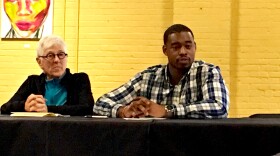Dozens of families filed into the downtown branch of the Grand Rapids Public Library on Sunday afternoon for an educational Day of the Dead celebration.
Little skeletons and a Latin Ska are generally not what comes to mind when one thinks of public libraries. But for Day of the Dead, kids and grownups got their faces painted as skeletons,
"He’s not going to get me?
-He’s not going to get you.
-We’re not that kind of dead people."
And the Latin Ska band Cabildo rocked out for the families learning about Day of the Dead.
[Cabilido Music]
But beyond the fun and the food, it’s the altars that are the traditional highlight. Maribel Garcia de Navarro is from Ciudad Ixtepec, in Mexico’s state of Oaxaca. She set up a large altar at the Grand Rapids library in memory of her passed family members.
“Egg yolk bread, mole, chocolate, their water, a little salt dish to purify spirits, the water is for thirst, because they come thirsty. And fruit, whatever they liked. For example, for my mom we set out grapes and appels, for my dad too. My grandmother loved pomegranate.”
Garcia de Navarro says for her it’s more than just a celebration, she takes three days off every year.
“I put in the time for my late loved ones. I prepare their food, burn incense, I purify their altar, I play the song “God never dies” for them at noon. I light candles for them and everything. I don’t miss out on my traditions for anything in the world.”
So whether it’s building new memories with one’s children, enjoying a concert with one’s friends, or remembering relatives and ancestor, it seems this Latin American tradition is alive and well in West Michigan.





